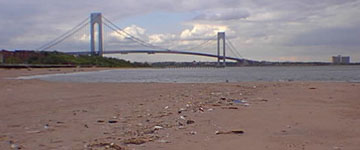68. South Beach, Staten Island
The beaches along the south shore of Staten Island are not as popular as the Atlantic beaches of New Jersey or Long Island (see Figure 159 on the Raritan Bay page). This is in part because of the traditionally poor water quality of the bay, the abundance of garbage that washes ashore, and the cost and effort it takes to get to Staten Island from the rest of the City. In recent years, great effort has been taken to clean up the Staten Island beaches and to improve the park facilities along the south shore, particularly at Great Kills Park (part of Gateway National Recreation Area). Still, a walk along South Beach provides a scenic view of the Outer New York Bay (Figure 183).
 |
| Figure 183. A view of the flotsam-covered South Beach of Staten Island with the Verrazano Bridge. |
In general, the beaches along the south shore are largely artificial or modified. An examination of the sand near the Verrazano Narrow Bridge shows the character of local sand sources. The sand fragments are much more angular than on the Atlantic beaches, and it includes an abundance of feldspar, mafic fragments and sedimentary iron, reflecting the sediment source areas in the Highlands Region and the Newark Basin. Although the beach has been partially replenished artificially, this sand is in part derived from the progressive erosion of glacial till and moraine materials exposed to erosion in the vicinity of the Narrows northwest of the Verrazano Bridge.
| Return to Our Transient Coastal Environment. |